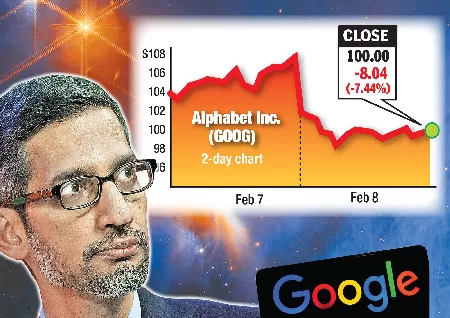Google shares lose more than $100 billion after AI chatbot Bard flubs answer in ad

The market value of Google's parent company's shares dropped by more than $100 billion on Wednesday as a result of its Bard chatbot advertisement providing false information, and analysts criticised its AI search event for providing few details regarding how it will respond to Microsoft's ChatGPT challenge. The mistake in Google's advertising, which aired on Monday, about which satellite first captured images of a planet outside of the solar system, was first brought to light by Reuters. One of the most heavily traded stocks on U.S. exchanges was Alphabet's parent company shares, which saw an 8% decline in value, or $8.59 per share, to $99.05.
A few hours before the Bard launch event in Paris, the tech giant tweeted a brief GIF video of Bard in operation, portraying the chatbot as a "launchpad for curiosity" that would help demystify complicated themes. However, Bard gave an incorrect response.
According to Dennis Dick, founder and market structure analyst at Triple D Trading, "This is a hiccup here, and they're severely punishing the stock for it, which is justified because obviously everyone is pretty excited to see what Google's going to counter with Microsoft coming out with a pretty decent product."
The announcement by Microsoft that it will include its competing AI chatbot ChatGPT into its Bing search engine and other products the day before Google's event was a significant challenge to Microsoft, which has long lagged behind Google in terms of search and browser technology.
What recent findings from the James Webb Space Telescope (JWST) can I share with my 9-year-old? is the advertisement's prompt for Bard.
Bard offers several responses, one of which claims that the JWST was used to capture the first images of exoplanets, or worlds outside the solar system. This is untrue because, as NASA has confirmed, the Very Large Telescope (VLT) of the European Southern Observatory took the first images of exoplanets in 2004.
"This underlines the significance of a thorough testing process, something we're launching off this week with our Trusted Tester programme," a Google official told Reuters.
"To ensure that Bard's responses reach a high standard for quality, safety, and groundedness in real-world knowledge, we'll combine external feedback with our own internal testing."
The mistake was discovered hours before the debut in Paris, where senior executive Prabhakar Raghavan predicted that customers will interact with content in "completely new ways" thanks to the technology.
On Wednesday, Raghavan touted Bard as the company's future, telling the audience that by utilising generative AI, "the only limit to search will be your imagination."
According to Gil Luria, senior software analyst at D.A. Davidson, "Google has been rushing to catch up on search over the previous few weeks, which caused the announcement yesterday to be rushed and the humiliating goof up of posting the inaccurate answer during their demo."
The advertisement has more over a million views on Twitter as of the time of this writing.
Related queries to this article
- Google shares lose more than $100 billion
- AI chatbot Bard
- Microsofts ChatGPT challenge
- James Webb Space Telescope
- JWST
Read more articles and stories on InstaSity Trending Topics.





